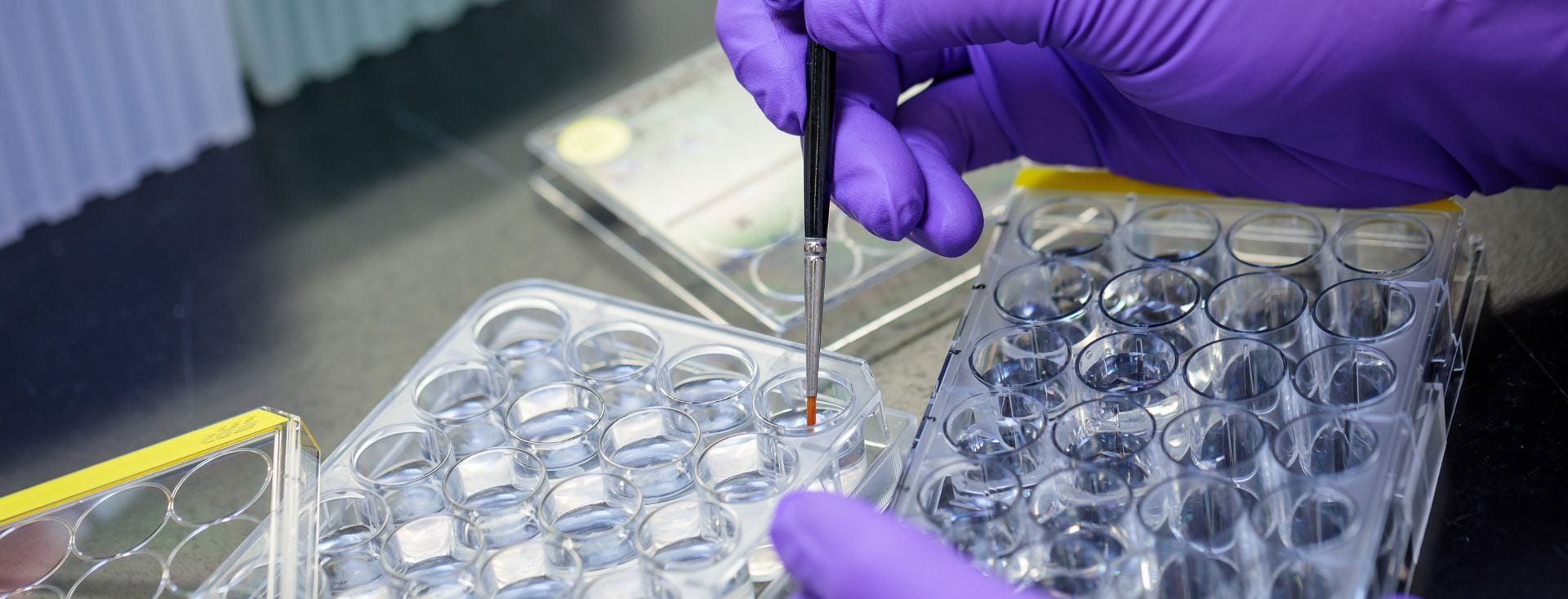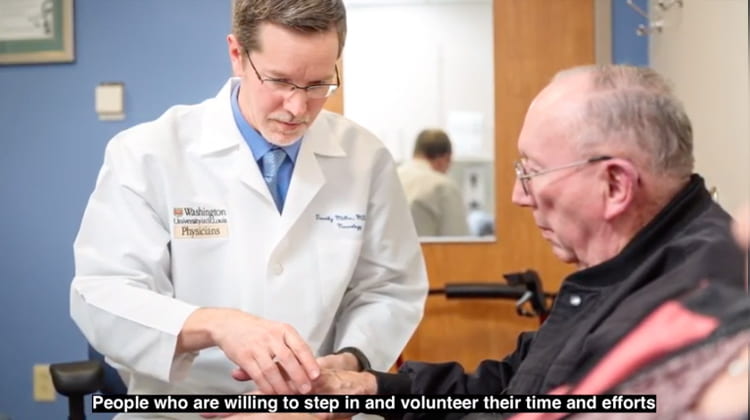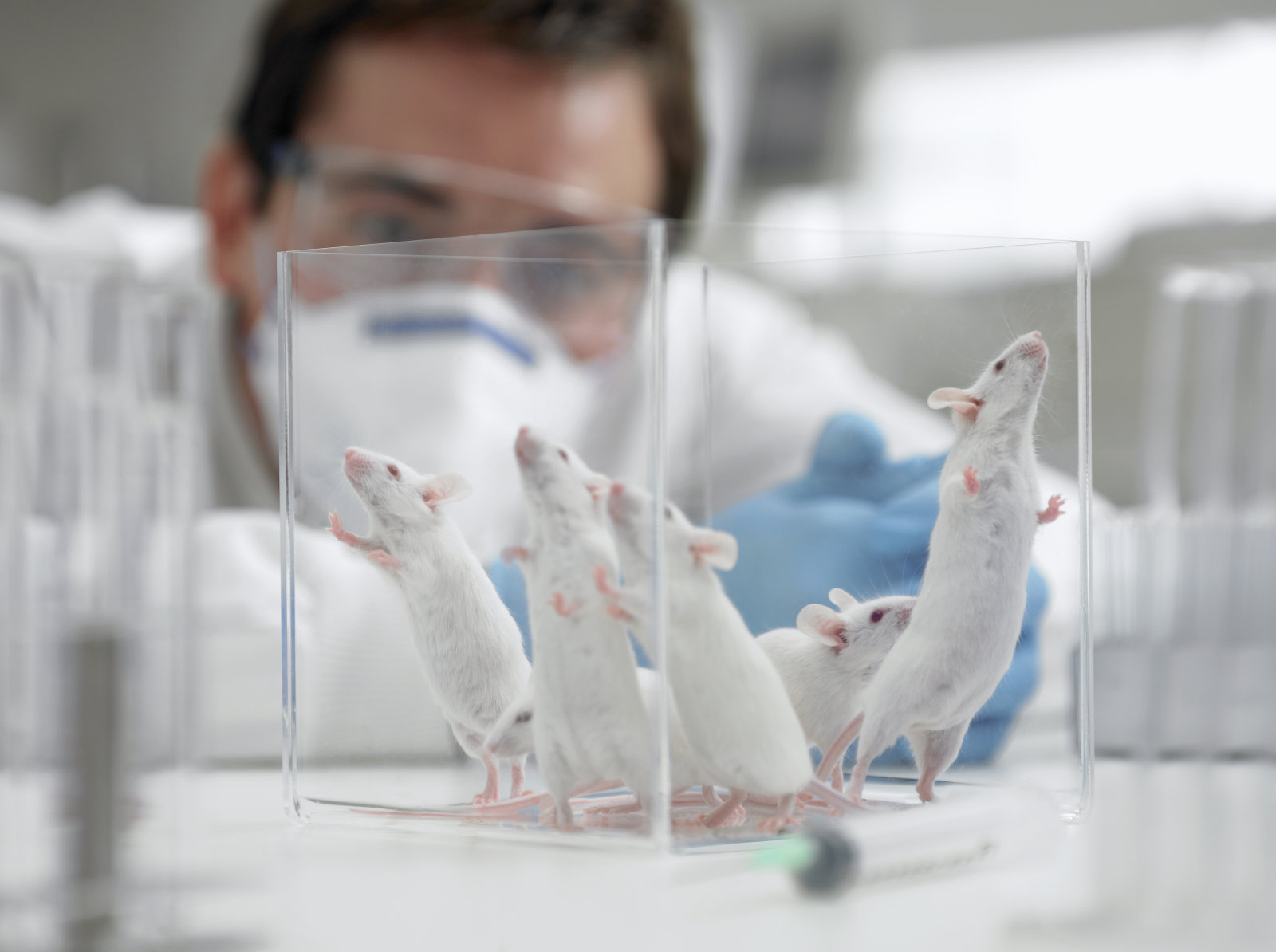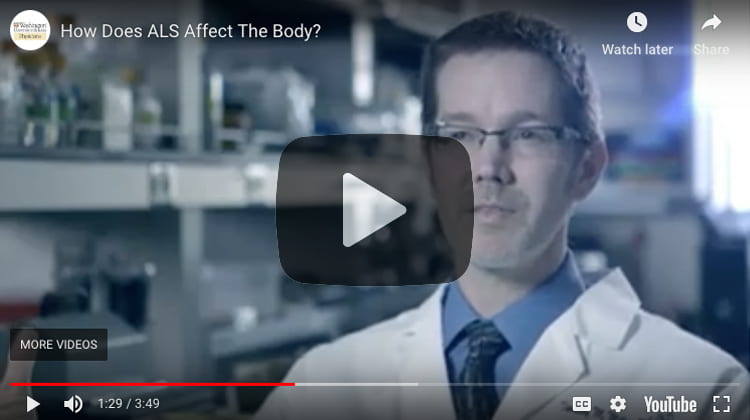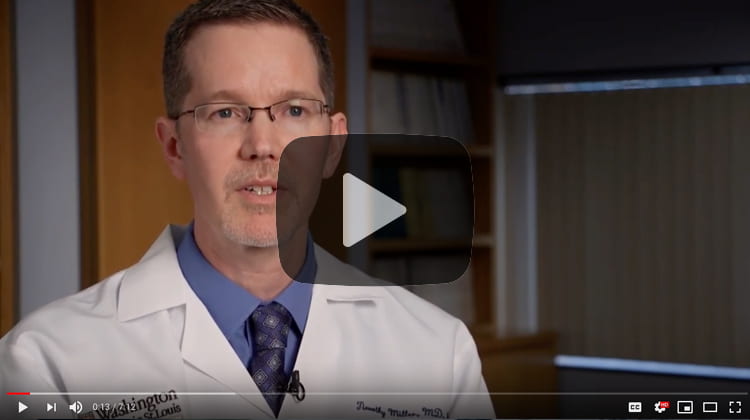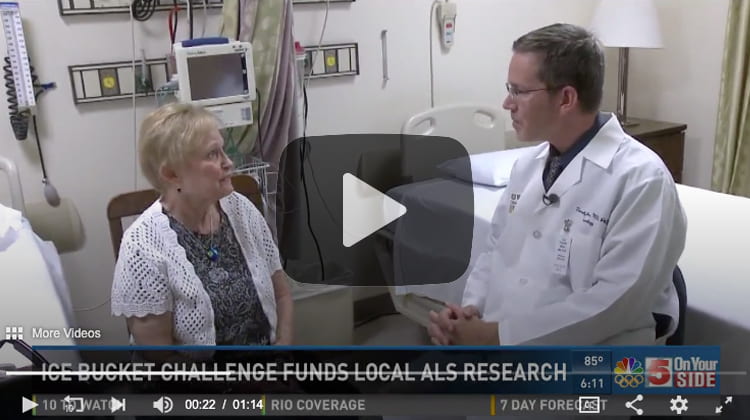Dr. Miller’s exciting research in the field of neurodegenerative diseases consistently generates national and international interest.
Investigational drug for genetic form of ALS improves disease’s molecular signs (Links to an external site)
The trial, sponsored by the pharmaceutical company Biogen, showed that an investigational drug, known as tofersen, reduced molecular signs of the fatal disease, but at six months did not improve motor control and muscle strength. However, Miller and colleagues found evidence that longer-term use of the drug may help stabilize muscle strength and control.
Tofersen Phase 3 Drug Results and Use with ALS
At the American Neurological Association (ANA) Annual Meeting, Dr. Timothy Miller presented VALOR study of Tofersen Phase 3 Drug Results and Use with ALS. Tofersen is an antisense drug being evaluated for the potential treatment of SOD1-ALS. For more information and to learn about Tofersen Phase 3 Drug Results please see links below. Biogen Announces Topline […]
Biogen and Ionis report positive topline clinical data on investigational Alzheimer’s disease treatment at AAIC (Links to an external site)
Promising Results for Investigational Treatments for Inherited ALS (Links to an external site)
Two preliminary studies were published simultaneously in the New England Journal of Medicine, both aimed at reducing superoxide dismutase 1 (SOD1) protein levels in people who had amyotrophic lateral sclerosis (ALS) due to SOD1 mutations. In the first study, a phase I/II trial of intrathecal tofersen, Timothy Miller, MD, PhD, of Washington University in St. […]
Tofersen demonstrates positive results in Phase I/II trial for amyotrophic lateral sclerosis (Links to an external site)
Biogen (MA, USA) has announced positive results from a Phase I/II study of tofersen – an antisense oligonucleotide – for the potential treatment of SOD1 amyotrophic lateral sclerosis (ALS). These results have been published in The New England Journal of Medicine.
Experimental drug shows promising results for rare form of ALS (Links to an external site)
Researchers led by a Washington University neurologist found promising results for an experimental drug to treat a rare, inherited form of amyotrophic lateral sclerosis (ALS), commonly known as Lou Gehrig’s disease.
Research in St. Louis leads to promise in the fight against ALS (Links to an external site)
ST. LOUIS – Research taking place at Washington University’s School of Medicine is giving hope to those affected by amyotrophic lateral sclerosis (ALS), also known as Lou Gehrig’s disease.
Experimental drug shows early promise against inherited form of ALS, trial indicates (Links to an external site)
Phase 1/phase 2 trial shows evidence for safety, biological activity of tofersen; phase 3 trial underway
Healey ALS Platform Trial receives “May Proceed” notice for three drugs (Links to an external site)
The Sean M. Healey & AMG Center for ALS at Mass General has received approval from the U.S. Food and Drug Administration (FDA) to proceed with administering three proposed drug regimens in the HEALEY ALS Platform Trial – the first trial of its kind for amyotrophic lateral sclerosis (ALS).
Prospective natural history study of C9orf72ALS clinical characteristics and biomarkers
Prospective natural history study of C9orf72ALS clinical characteristics and biomarkers Our team’s hard work has been published in Neurology. This paper profiles the clinical features, such as age at disease onset, survival duration, and measures of disease progression, of ALS patients with mutations in the C9orf72 gene. By defining the natural history of this patient […]
Miller receives international innovation prize (Links to an external site)
Recognized for developing experimental treatment for ALS
New Diagnostic Test for Neurofilament
Biomarkers are measures reflective of biological processes that occur in the body. In the setting of disease, biomarkers may be used for diagnostic, prognostic or treatment monitoring purposes.
Challenge Me to Find the Path to a Faster Diagnosis of ALS
With funds raised through the ALS Ice Bucket Challenge, The ALS Association has been able to invest significantly in the identification of biological indicators (or biomarkers) for ALS.
Antisense Drugs for Huntington’s, ALS and Prion Diseases Could Meet the Dire Need for Brain Treatments (Links to an external site)
A genetic therapy that increases or lowers levels of a protein raises hopes for a treatment for neurological disorders.
Experimental Drug Shows Promise for Genetic Form of ALS (Links to an external site)
An early stage trial of an investigational therapy for amyotrophic lateral sclerosis (ALS) suggests that people could tolerate the experimental drug and, in exploratory results, the experimental drug was linked to possible slower progression in people with a genetic form of the disease caused by mutations in a gene called superoxide dismutase 1 (SOD1).
Experimental treatment could be ‘game-changing’ for genetic ALS, experts say (Links to an external site)
(CNN) An experimental treatment for the rapidly progressive disease ALS, or amyotrophic lateral sclerosis, has been called potentially “game-changing.”
Scientists Reverse Alzheimer’s-Like Symptoms in Mice (Links to an external site)
Engadget states, “Scientists have discovered a way of counteracting proteins that cause Alzheimer’s-like symptoms including memory loss. Researchers at Washington University in St. Louis, Missouri focus on tau protein tangles.” in an article about Dr. Miller’s 2017 STM publication.
Scientists Stop and Reverse Alzheimer’s-Related Brain Damage in Mice (Links to an external site)
A news release by MNT examines Dr. Miller’s 2017 STM publication. “The team studied the effects of the synthetic molecules on crab-eating macaques. They administered two doses of antisense oligonucleotides or two doses of a placebo, 1 week apart, directly into the cerebrospinal fluid – as one would when treating humans. The trial revealed that, in monkeys […]
Molecule Throws Roadblock in Alzheimer’s Path (Links to an external site)
An article by New Atlas describing Dr. Miller’s STM work states, “When it comes to the drama of Alzheimer’s disease, the compound in the starring role as the villain is tau. It’s a protein that normally helps our neurons function properly, but one that can clump together into plaques that damage brain cells. Now researchers have […]
New DNA-Like Drugs Show Promise in Treating Alzheimer’s (Links to an external site)
An article by Scientific American describes Dr. Miller’s Science Translational Medicine publication. “The small molecules cleared and prevented tau buildup in mice and monkeys.”
Antisense Oligos Tango with Tau Transcripts to Reverse Tauopathy (Links to an external site)
In an article about Dr. Miller’s newest Science Translational Medicine publication, ALZFORUM writes, “In collaboration with the pharmaceutical company Ionis in Carlsbad, California, Timothy Miller and his colleagues at Washington University in St. Louis designed a potent ASO that shuts down human tau gene expression in transgenic mouse models.”
Publication by Mariah L. Hoye, PhD Candidate
Congratulations to Miller Lab member Mariah L. Hoye on her publication! Mariah is a PhD candidate who is studying microRNAs, which are small compounds that regulate a variety of processes in the body, and their role in ALS disease progression. Her manuscript that investigates microRNAs specific to motor neurons in ALS rodent models was recently […]
Video: C9 ID: Accelerating a therapy for ALS patients with C9 mutations
In this video Dr. Timothy Miller provides an excellent explanation of how ALS works in the body and what researchers are doing to bring a therapy to ALS patients, especially those with mutation in the C9ORF72 gene.
Publication by Kathleen Schoch, PhD
Congratulations to Miller Lab member Kathleen Schoch on her publication! Dr. Kathleen Schoch is a postdoctoral research assistant in the Miller Lab who focuses on dementias characterized by the pathological accumulation of the protein “tau”. She published a paper in Neuron that examined the potential of a unique tau-lowering therapeutic strategy to treat Alzheimer’s disease, […]
Video: Advances in ALS Treatment
Washington University neurologist Timothy Miller, MD, discusses advances in ALS treatment.
Dr. Timothy Miller Wins Sheila Essey Award for ALS Research (Links to an external site)
The ALS Association, in partnership with the AAN and the American Brain Foundation, are awarding research funding to Timothy M. Miller, M.D., Ph.D., the David Clayson Professor of Neurology from the Washington University School of Medicine in St. Louis. The award recognizes significant research contributions in the search for the causes, prevention, and cure for amyotrophic lateral sclerosis (ALS). Since 1996, The ALS Association and the American Academy of Neurology have jointly chosen recipients of the award.
Ste. Genevieve Riverdogs Baseball Team Supports ALS Research
Prior to the final game of the season, the Ste. Genevieve Riverdogs baseball team surprised Coach Jeremy Hoog with a touching tribute as well as a donation to Dr. Timothy Miller’s ALS Research Lab in honor of Coach Hoog’s mother – and the Riverdogs’ biggest fan – Cheryl.
Medical Research Roundup: Dr. Tim Miller Awarded Research Grant from NIH (Links to an external site)
The Miller Lab has found differences between healthy people and people with amyotrophic lateral sclerosis (ALS) in biomolecules known as microRNAs. This project seeks to understand the microRNA differences and the effect of adjusting them to try to develop new diagnostic tests or treatments for ALS.
Dr. Timothy Miller and Team Win the TDP-43 Biomarker Grand Challenge (Links to an external site)
The team is developing a unique imaging biomarker to track TDP-43, a protein found in almost all cases of ALS.
ALS Ice Bucket Challenge helps fund Washington University’s research
Dr. Timothy Miller is featured in this news release describing how the money raised in the ALS Ice Bucket Challenge has helped discover new genetic causes of this disease. KSDK TV St. Louis
NEALS Webinar: “C9: From ID (Identification) to Therapy”
Dr. Timothy Miller, Washington University, and Dr. Merit Cudkowicz, Massachusetts General Hospital, provide an update on the C9orf72 Natural History Study and discuss therapies in development for C9 patients.

